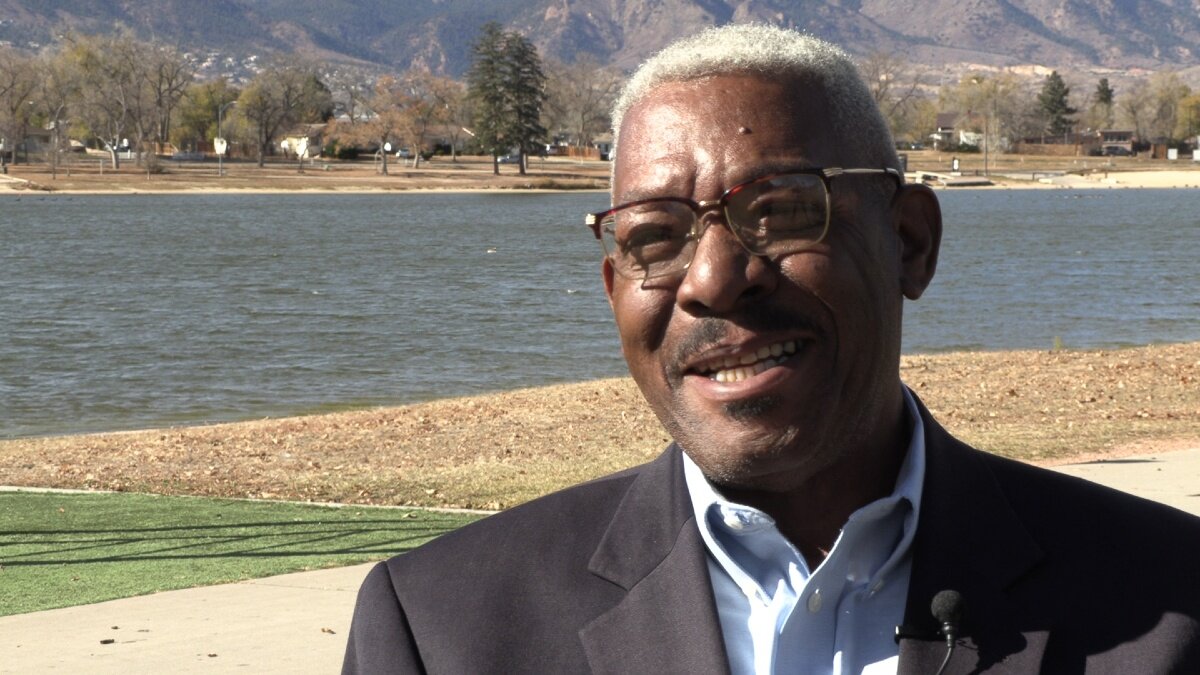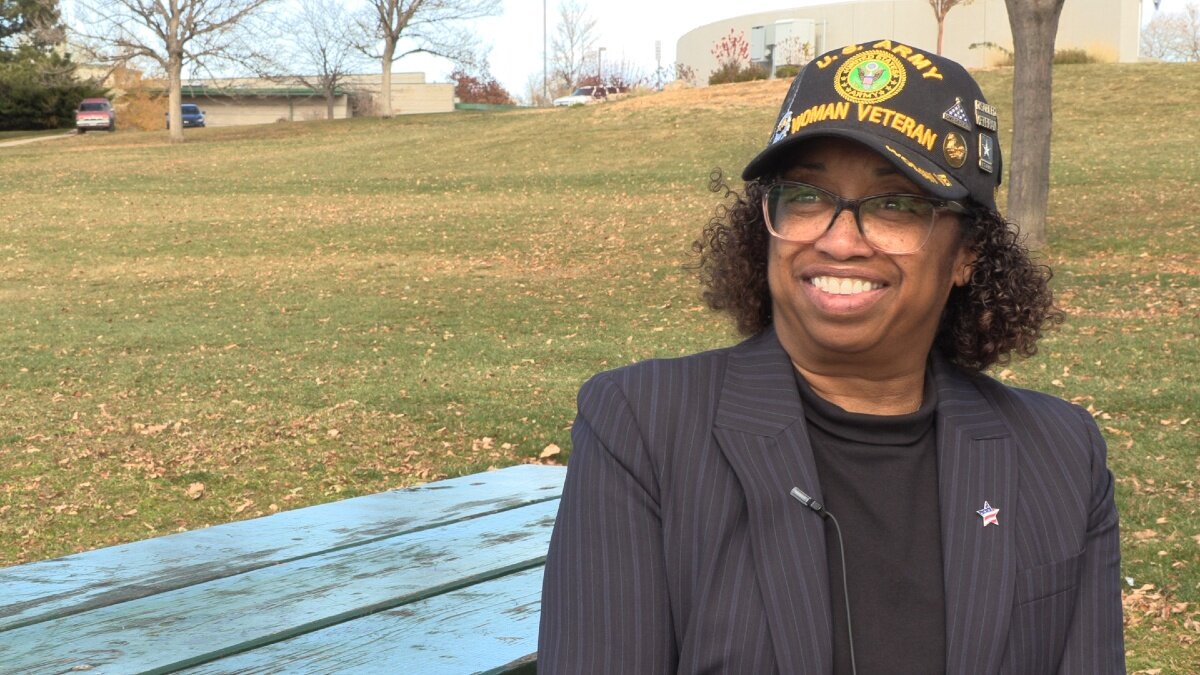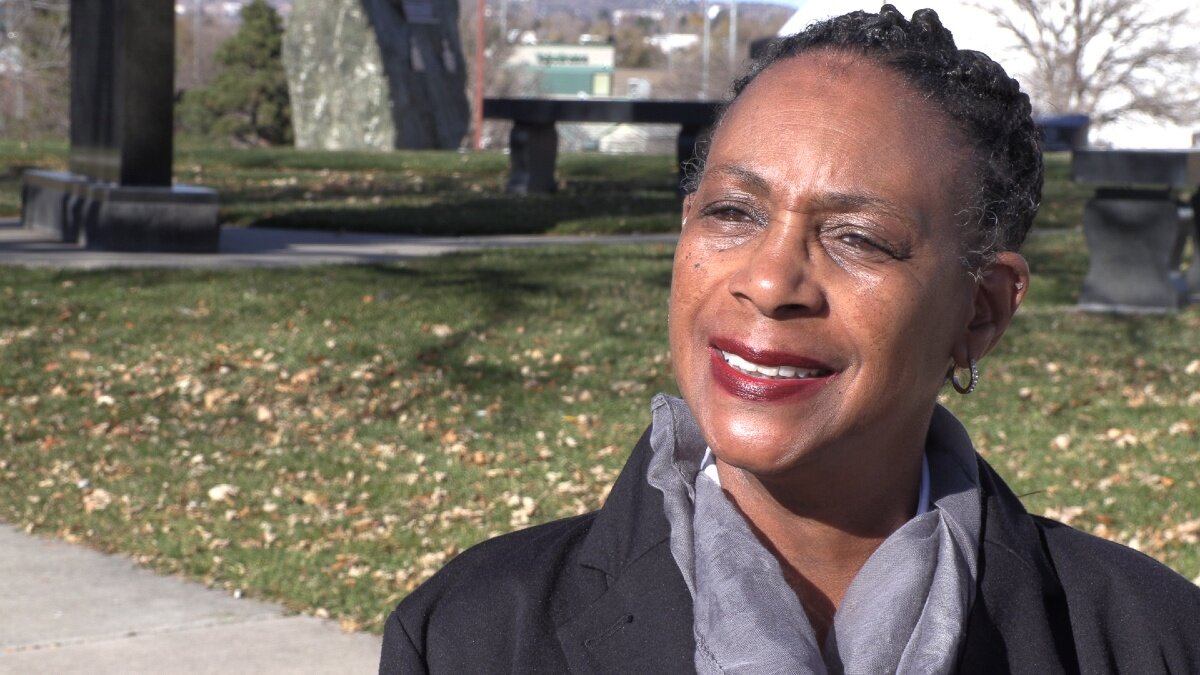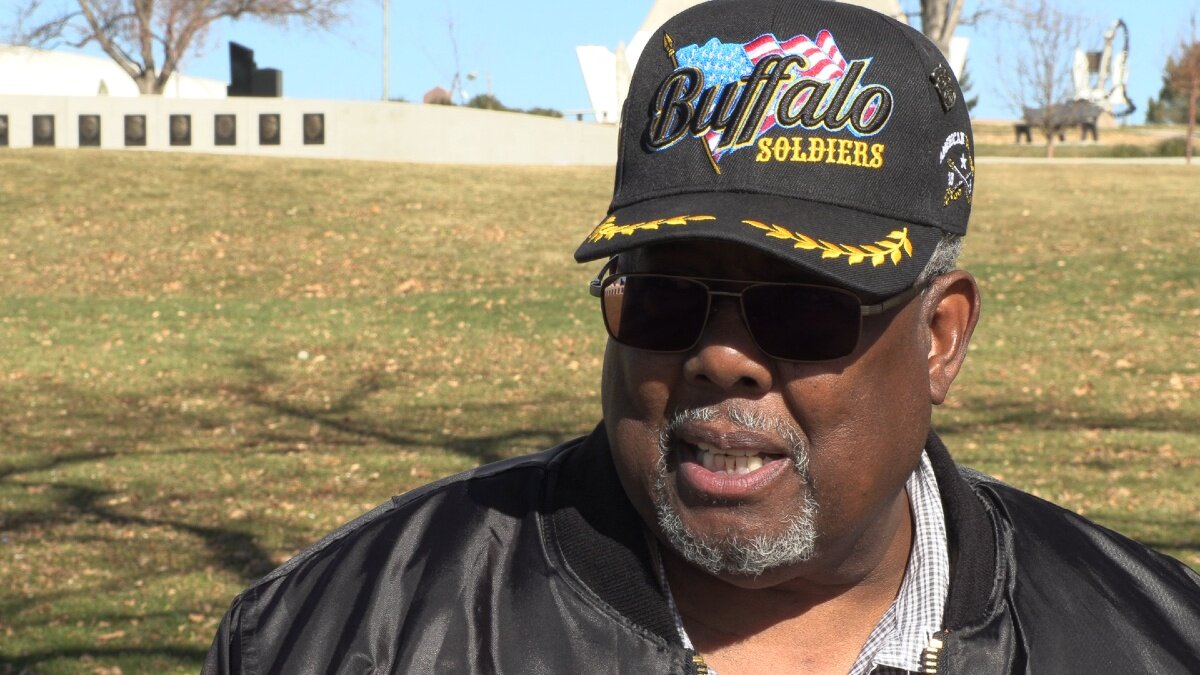Black veterans in Colorado reflect on the joys and struggles of their military service

COLORADO SPRINGS, Colo. — Colorado Springs is home to tens of thousands of veterans, each of them with unique, powerful stories about their time serving the United States. Veterans Day was a day for veterans to reflect on the triumphs and sorrows of their service. But for many of the Black veterans living in Colorado Springs, their military service included challenges their white counterparts did not have to face.
The day before Veterans Day at Memorial Park in Colorado Springs, four Black veterans shared their voices with Rocky Mountain PBS. They spoke about the racism and bigotry they endured during their time in the military, as well as the joys of serving, the heartbreak of losing soldiers and the sorrows of losing family members who also served to suicide.
Terrance McWilliams
Terrance McWilliams joined the military to escape the small town of De Leon Springs, Florida, where he grew up. Many people he knew there picked oranges for a living.
“That just was not for me,” explained McWilliams, a retired Command Sergeant Major. “I wanted to be part of something greater than myself, so I joined the military.”
He enlisted in the Army in December of 1976 and was shipped to basic training in June of 1977 at the young age of 18.

“Being a young soldier, you had to be determined to prove yourself, that you’re capable and better than the person standing to the right or left of you,” McWilliams continued. “This gave me my drive and motivation to excel in everything that I did.”
McWilliams shared that his uniform didn’t exempt him from hatred.
“When I graduated from basic and advanced individual training, I was given 17 days of leave before reporting to Germany. I was in my uniform at a Louisville, Kentucky Greyhound bus station waiting to catch a bus, and as I was waiting there, a lady threw a McDonald’s milkshake on me... why?” McWilliams recalled.
Whether the woman was racist or against the war in Vietnam (or both), McWilliams wasn’t sure. But he had a much better experience with the civilians in Europe.
McWilliams said the Germans treated him with respect; they did not care about his Black skin and ultimately treated him like an equal. “I admired the people in Europe,” he said. “They treated me better than my fellow Americans. You have to understand that American was divisive back then. Racism was running rampant.”
McWilliams also recalled white American soldiers wearing their bedsheets like a Ku Klux Klan robe and seeing white soldiers conducting cross burnings in front of the barracks.
McWilliams said that despite the disgusting behavior he endured from white soldiers and white Americans, the military changed his life for the better.
“It’s about sacrifice, it’s about honor, it’s about duty, it’s about serving the greater good,” he added.
McWilliams reflected on an extraordinary military time for him. He talked about the time he was Command Sergeant at Fort Carson, where at one point he oversaw 2,800 soldiers. Tragically, he said nearly 400 of them perished but not in vain.
“I got to know each and every one of my soldiers, 397 of them paid the ultimate sacrifice; these were all young soldiers, they knew the risks,” McWilliams said. “They did not die in vain, but you have to ask yourself, ‘Why did you volunteer to join knowing you could lose your life?’ I have the answer. They wanted to be something larger than themselves. And they were. They are all heroes in my book. All I can say is thank you.”
What does Veterans Day mean to you?
"Veterans Day, for me, is me is a day I reflect. I reflect on all those I served with and those who sacrificed for our freedoms and liberties. Most people take this for granted," said McWilliams. "I also think about the soldiers I lost in the first Persian Gulf War in Iraq and Afghanistan. These brave men and women paid the ultimate sacrifice so we could be free Americans.”
McWilliams now works for El Pomar Foundation as the Senior Vice President of Military and Veteran Affairs. He also serves as the Civilian Aide to the Secretary of the Army of Colorado (South). McWilliams also serves on the board of directors for Mt. Carmel Veterans Service Center, the State Board of Community Colleges and Occupations Education, USO of Colorado, and the advisory board for the Salvation Army.
Finally, McWilliams is also a member of the Buffalo Soldiers’ Colorado Springs chapter.
The Buffalo Soldiers were Black servicemen who organized after the Civil War. These men were known for being the first park rangers in backcountry locations.
Shirley Martinez
Shirley Martinez explained that she has been a “military brat” her entire life. Martinez, a retired Petty Officer 3rd Class in the U.S. Navy, was born in Waycross, Georgia, and grew up in Medical Lake, Washington. Her father was in the Air Force as a B-52 mechanic and served in the Vietnam War.
Martinez joined the Navy in October of 1978 at the age of 19 years old. She later joined the Army in 1981.

Her official title in the Navy was Petty Officer 3rd Class and she worked in radio operations. In the Army, she was welding specialist, a top-secret court reporter, and also worked in the JAG office.
From 2001 to 2020, Martinez worked as a senior compliance specialist and Diversity and Inclusion advisor at Colorado Springs Utilities. She currently is the Director of Equity and Inclusion for Pikes Peak Library District.
Martinez is passionate about many aspects of the military, but she is most passionate when serving as a peer leader for other women veterans. She is part of WoVeN, a program that helps foster connections among women veterans of all eras and service branches to empower them with information, education, and resources to improve their quality of life.
“Women, for the longest, have been in the backseat for just about everything. We are resilient and kept the families together. We did the finances while we served alongside our partners. We did everything,” Martinez said.
Martinez also spoke about the sacrifices that each soldier and their families make, and the impact it can have on mental health.
“I would say freedom isn’t free because we’ve all sacrificed something. We all put our lives on the line and missed time with our families. It doesn’t get any easier,” Martinez said. “I’m happy with the time I spent in the military, but you can’t take it off like a coat. It’s always with you.”
“Suicide or suicidal thoughts is something that can be found among those who served,” Martinez continued.
[Related: Colorado introduces new suicide prevention program for military veterans]
Sadly, Martinez said she lost her brother-in-law to suicide back in 2017. He was also a Navy veteran.
"We have to be there for each other,” Martinez said. “We need a solution to help get our heroes the appropriate counseling and people that are involved in eliminating veteran suicide.”
What does Veterans Day mean to you?
"Veterans Day means to me that we celebrate each other. We congratulate each other and that we don’t forget each other. We have Memorial Day, but for Veterans Day, I encourage people to reach out to someone they know and let them know you care because although serving is honorable, it is a hard life; it takes a toll,” said Martinez.
Mercedes J. Moore
Mercedes J. Moore, from Silver Springs, Maryland, served in the United States Air Force, enlisting when she was just 17 years old in April of 1979.
During her service, she worked her way up to a Chief Master Sergeant, E-9, which she explained is the highest rank you can achieve as an enlisted member, depending on the branch of service you’re in.
Moore said she enlisted because it was a challenge, and she wanted to prove herself to America.

“When I entered the military, there weren’t many jobs available for females. After getting into the military, learning discipline and other skills, I felt more equipped to want to make a difference,” Moore explained. “As a Black woman, I wanted, and did, show the military that women are capable of the same roles men held in service.”
Among other duties, Moore worked two tours in the Family Support Center, now called Family Readiness Centers. In 1985, Moore worked at Hanscom Air Force Base outside of Boston, Massachusetts. The second was in 1996 when she was the Deputy Director for the Family Readiness Center at Bolling Air Force Base in Washington, D.C.
Moore now serves as the Military Education Liaison for Colorado Technical University (CTU) in the Military Division.
Moore shared she loved her time spent in the military but said it was a rude awakening when she first endured prejudice: “I remember I called my mother crying because back in the day, I learned the difference between people of color and people of no color. I was told I couldn’t go certain places in the military because I was a Black woman.”
What does Veterans Day mean to you?
"Veterans Day is a whole new meaning for me, now that I’m a veteran. We put our lives on the line every day of the year. I want to thank the men and women who served before us. Although they didn’t get the recognition they needed, they need to know they paved the way for us," explained Moore. "When I entered the military, women were not very well-accepted, and my goal was to make waves, and I did. Women are resilient and press on. Women promoted and fought just as brave as men.”
Willie H. Breazell
Willie H. Breazell comes from a solid military background. He proudly explained that his father served in World War II. Breazell said he always knew he wanted to join the military, so much so that he enlisted at age 17 in July of 1962. His parents had to sign off for him to get started because he was still a minor.
Breazell is from La Cruces, New Mexico but was born in El Paso, Texas, at a military hospital.
During his time served, he was an Army Intelligence Officer with training in both signals intelligence and human intelligence.
Breazell, like the other veterans who spoke with Rocky Mountain PBS, said a common theme among Black military personnel is the hardships of enduring racism, bigotry and prejudice.

Breazell was previously the president for the local NAACP and during his tenure, received a letter from a retired World War II marine. The letter, dating back to May of 1943, detailed the racist policies against Black people who were joining the Marine Corps. The letter included a section explaining that Black and white people should not be photographed together and that a Black non-commissioned officer (NCO) should never oversee a white NCO.
“While rapid promotion, when deserved, is necessary, it is essential that in no case shall there be colored noncommissioned officer’s senior to white men in the same unit, and desirable that few, if any, be in the same rank,” the letter said.
“During my time, many white NCOs would not salute Black officers even though they were entitled to that military courtesy,” Breazell said.
Like McWilliams, appreciation and respect from people overseas is something that Breazell spoke about.
“Overseas, you were more accepted by foreigners than you were in your own country,” he said.
Breazell recalled an incident when he traveled back from serving overseas: When he stopped to get a hotel room in Birmingham, Alabama, the hotel personnel there quizzed him to make sure he wasn’t a civil rights activist or worker. Breazell said the man told him, “Civil rights workers are troublemakers.” Breazell said he assured the man he was not and that he was passing through on his way to visit his family in New Mexico.
“If I was a white soldier, would I have been asked this? I dare say not,” Breazell explained.
Breazell is the original pioneer in starting the Buffalo Soldier’s Memorial at Memorial Park, located in Colorado Springs. He was the committee chair, and was also the president of the Rotary Club of the Garden of the Gods and co-founder of the Black and Latino Leadership Coalition.
What does Veterans Day mean to you?
"My father was a World War II veteran, and when I think about Veterans Day, I think of how strong of a man and soldier he was. My father holds a unique place in the military. He was part of the VFW, Veterans of Foreign Wars, and the American Legion," said Breazell. "The people committed to serving the nation at the highest level deserve the highest recognition and appreciation as long as they live.”